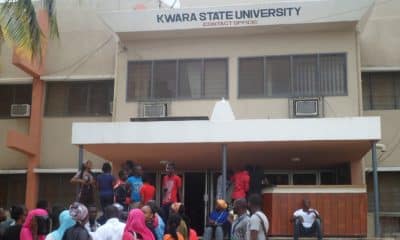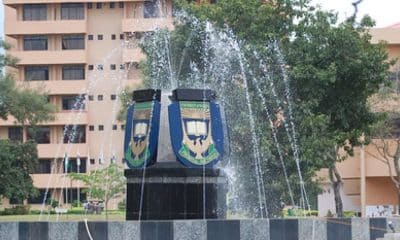Nigeria News
Mmesoma: The Chickens We Raised Have Come Home To Roost

It is often said that man will forever be a product of the society that raised him.
Afterall a philosopher in the 17th century, John Locke once propounded a theory stating that man at birth is a tabula rasa.
This means that the human mind at birth is a clean slate without rules for processing data.
The philosopher stated that the human mind receives knowledge and forms itself based on experience alone, without any pre-existing innate ideas.
Little wonder, people from a certain region and country often have behavioural similarities, at the end of the day we simply mirror the society that has raised us.
Recently, Nigeria was faced with the glaring truth that we might have failed in instilling the right values in the younger generation when our very own bright-minded Mmesoma Ejikeme broke our hearts and tried to forge her Unified Tertiary Matriculation Examination (UTME) result.
The teenager had inflated her score from 249 to 362 in a bid to claim ownership to a N3million naira scholarship offered by Innoson Vehicles Company.
However, the Joint Admission and Matriculation Board (JAMB), dismissed her result as fake, accusing her of manually inflating her score.
When Mmesoma was presented with incontrovertible evidence by JAMB, she admitted that indeed she had manipulated her score.
In today’s rapidly changing world, the importance of instilling the right societal values such as honesty, truth, and hard work in the younger generations cannot be over emphasized.
Societal values serve as guiding principles that shape our behaviours, actions, and interactions with others. Honesty, truth, and hard work are fundamental values that cultivate our character.
But the question remains do the older generation have these values within them, are they practicing and living it. At the end of the day you can only give what you have.
Examination malpractices such as cheating, impersonation, leakages, and falsification of results have have eaten deep into our educational system. This phenomenon not only undermines the integrity of the education system but also erodes the moral fibre of the nation.
Examination Malpractice; A Walk Down History Lane
This disease slowly eating into our educational system and has become an endemic threatening the future of the youths began as far back as 1914.
It was reported that the question papers of the then Senior Cambridge Local Examinations were leaked to students even before examination day. From then on, the practice has refused to abate.
In a bid to combat the practice, the nation’s examination bodies, West African Examination Council (WAEC), National Examinations Council (NECO) and the Joint Admission and Matriculation Board (JAMB) have continued to introduce new measures and policies.
Statistics showed that in 2018, out of 1,572,396 candidates that sat for WAEC, 102,058 results were withheld over exam malpractice, while in 2019, out of 1,590,173 candidates, 180, 205 results were seized; while 215,149 results out of 1,538,445 candidates that sat for 2020 examination.
For candidates that sat for Unified Tertiary Matriculation Examination (UTME), of the 1.7million candidates in 2017, 79,123 results were withheld; 111,981 out of 1,652,825 candidates that sat for the examination in 2018. In 2019, more than 1, 826, 839 sat for the exam, but reports of malpractices, including an allegation that a particular candidate registered more than 60 times to do mercenary examination for different candidates caused the body to delay the release of the results.
While trying to find a lasting solution to the problem, the examination bodies have accused parents, supervisors and invigilators of frustrating their efforts in bringing an end to the scourge.
They insist that parents are the ones that provide funds for their children to carry out the nefarious acts. Some even go as far as taking their children to special centres.
How Can We Effect Change
In 2019, JAMB had lamented that there was a link between corruption and examination malpractice in the country.
The board insisted that corruption is rife in Nigeria because many corrupt leaders started with examination malpractices.
The board said, “Corruption is not a peculiar African or Nigerian problem. Regrettably, most of the measures deployed to fight corruption, more often than not, fail to yield desired results. If the malaise of corruption is not holistically addressed at the stage of examination malpractice, which is most times sponsored by parents, it will grow to become a monster.
“Many corrupt leaders today might have started off on this path through experimenting with examination malpractices. It is a fallacy to think that such individuals would outgrow such acts. This set of individuals mature to something more destructive and demeaning in the long run. The polluting effects of corruption warrant the adoption of a holistic approach in fighting corruption right from the school level.
“JAMB is leading the onslaught against perpetrators of examination infractions. It is the responsibility of citizens and other government agencies to sign up for this critical national assignment. Unfortunately, national challenges are sometimes perceived by Nigerians as the exclusive headache of the agency.”
Some school owners in the past have shared their thoughts on the reason for the continuous treachery despite attempts by education bodies to put an end to the situation.
Proprietor of De Vessels Nursery and Primary School, Ijeododo, Nkechi Amaji, said the menace is multifaceted.
According to her, some parents do not have time for their children while some private school owners employ unqualified teachers and register their students in special centres.
She identified poor orientation on the part of some parents, school owners, teachers and students for aiding examination malpractice.
Aside employment of unqualified teachers, Amadi also identified poor and hungry invigilators that demand for bribe when they go for invigilation as part of the problem,
“As an educationist, invigilators should be honest and do their work with integrity. Some of them are the ones encouraging students and schools to engage in malpractice. if they do their work as required, exam malpractice will be reduced to the barest minimum,” she had said
Proprietor, Devine-Solace Elementary School, Olarenwaju Arilesere said all stakeholders should be blamed for the scourge.
She also blamed the system, which encourage the idea that certificate is more important than skills to deliver, which is what lures students into malpractice just to have the required certificate to be where they would like to be.
“This notion is at the base of several factors causing examination malpractice. These include personal factors that have to do with laziness on the part of students, poor study habits, inadequate preparation for examination, lack of self-confidence; social factors such as peer-pressure and environmental factors such as overcrowding of students in examination halls, sexual favours, compromised invigilators and supervisors,” she said.
Conclusion
One of the objectives of education in Nigeria is to prepare the young ones to face future challenges and develop them to meet the nation’s manpower requirements.
However, in Nigeria, the prevalence of examination malpractices serves as a threat to the future of our society. What is a country without knowledgeable and seasoned youths?
How do we survive, how do we generate income when those who are meant to be the backbone of the society are clueless and have been spoon-fed all their lives.
This situation has gone beyond the crime committed by Mmesoma and has become a national menance that requires urgent solution.
It is time for parents, teachers, guardians to look at the man in the mirror and question the ideals being instilled in the younger generation.












